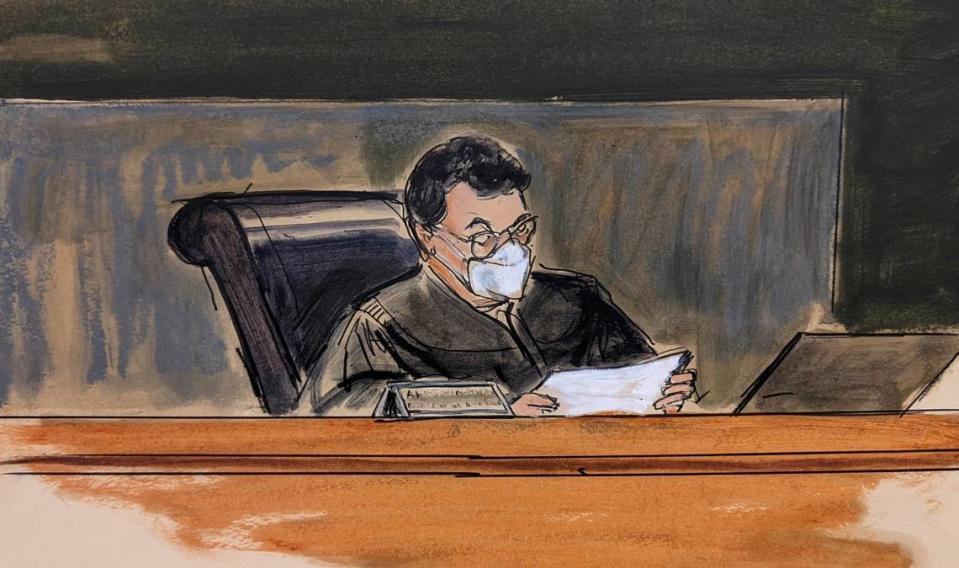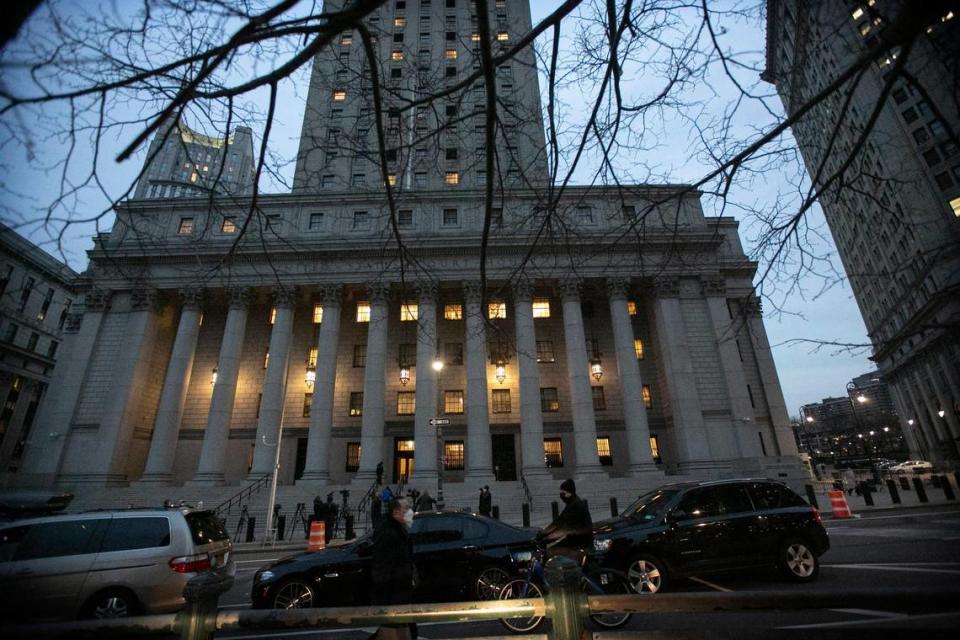Prosecutors seek immunity for Ghislaine Maxwell juror ahead of hearing on whether he lied
Federal prosecutors are seeking to grant immunity to a juror who failed to disclose his past sexual abuse victimization during the jury selection process for Ghislaine Maxwell’s trial on six charges connected to the sexual trafficking of minors.
The Maxwell juror is scheduled to testify at a hearing next week on whether he deliberately lied about his past, omitting mention of being abused to win a spot on the jury. At stake in the end is whether Maxwell, Jeffrey Epstein’s longtime companion and alleged fellow sex trafficker, should be granted a new trial because of the omission.
Giving the man, referred to as juror 50, immunity would free him to provide answers that might otherwise earn him a perjury charge.
The juror spoke publicly about his past victimization after Maxwell’s conviction Dec. 29, 2021, on five of the six counts, including sexual trafficking of a minor. He said he discussed the matter during deliberations, potentially helping nudge fellow jurors in the direction of a guilty verdict.
The problem was that during jury selection he did not disclose that facet of his past. Maxwell’s lawyers took notice, and suggested that their client deserved a new trial.

The juror’s attorney, Todd Spodek, had indicated in a letter filed to the court Tuesday that he planned to invoke the Fifth Amendment privilege against self-incrimination at the March 8 hearing. The prosecutors indicated in a subsequent letter that they are seeking internal approval to grant the juror immunity. Maxwell’s team filed a letter Wednesday seeking more information from the juror’s lawyer about why he planned to invoke the Fifth Amendment and more information from prosecutors about their willingness to grant the juror immunity.
Legal experts say the development improves Maxwell’s chances of winning a new trial, though it’s in no way a foregone conclusion.
“Before I thought that their chances were less than 50%, now they’ve got at least a 50-50 shot,” said David S. Weinstein, a former federal prosecutor and partner at the law firm Jones Walker.
All potential jurors were required to complete a 20-page questionnaire, under the penalty of perjury, that asked about a variety of life experiences, including whether they, a family member or friend had been the victim of sexual harassment, sexual abuse or sexual assault. The juror’s completed questionnaire, which was released publicly last week, shows that he had answered no to that question.
In press interviews afterward, he said he discussed his experiences with other jurors to explain why the memories of abuse victims are sometimes imprecise.
In ordering the hearing, Judge Alison Nathan said it would focus narrowly on whether the juror had misled the court.
“The potential impropriety that warrants a hearing is not that someone with a history of sexual abuse may have served on the jury. Rather, it is Juror 50’s potential failure to respond truthfully to questions during the jury selection process that asked for such material information so that any potential bias could be explored,” she wrote.
Maxwell’s conviction could mean decades behind bars if it is upheld. Maxwell was accused of recruiting and grooming four girls to be abused by her ex-boyfriend, Epstein. He died in federal custody in August 2019, one month after being arrested on sex charges related to his alleged abuse of numerous young women and girls. The trial showed how Maxwell had recruited victims to be abused at Epstein’s mansions in New York and Palm Beach, as well as at his ranch in New Mexico and her home in London.

Epstein escaped harsh penalties when he was investigated for abusing girls at his Palm Beach mansion more than a decade before. The controversial plea deal he struck with South Florida federal prosecutors allowed him to ultimately serve 13 months in a county jail and plead guilty to two state solicitation charges, one involving a minor. That plea was the subject of the Miami Herald’s 2018 Perversion of Justice series.
Maxwell’s lawyers argued in filings made public last week that they would have sought to have the juror disqualified had they known about his sexual abuse history. Federal prosecutors countered that eight jurors who indicated past victimization had been allowed to advance in the jury pool.
While Maxwell’s lawyers argued that the juror was biased based on his behavior after the trial, including social media posts in response to one of the victims who testified at the trial, prosecutors pointed to his statements in news reports that he had entered the trial with an open mind.
Veteran Miami defense attorney Joel Hirschhorn said he doesn’t think federal prosecutors took the question of seeking immunity for the juror lightly, but that they likely deemed the value of pursuing a case against him to be far less than the value of trying to uphold the Maxwell verdict.
“Her case is far more important than any one individual juror’s failure to be honest,” he said.
Weinstein also said that if the juror were not granted immunity, it could bolster Maxwell’s case if the verdict was upheld and she sought to appeal it.

